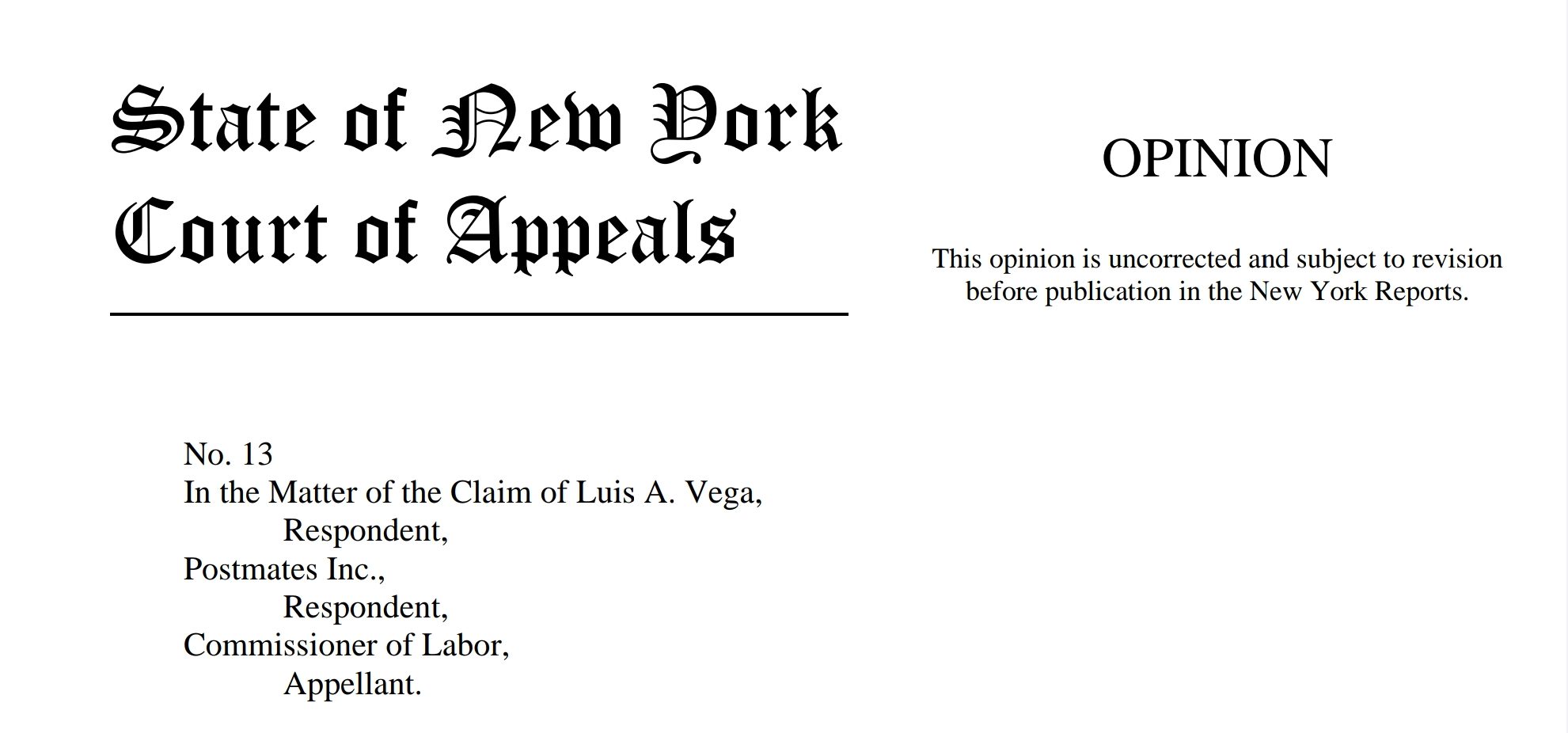- Free Consultation: (631) 352-0050 Tap Here to Call Us
New York Court Rules Gig Drivers are Employees

One of the hottest topics in the pre-pandemic world of employment law was whether gig drivers and workers are employees or independent contractors. The term gig worker applies to a variety of work arrangements, but is increasingly used to describe workers who provide services for online ride sharing businesses such as Uber and Lyft and online food delivery services such as Grubhub and Doordash.
For years, workers have been battling with the companies over the legal status of their work relationship. The question is whether gig workers are independent contractors or whether they are employees. Independent contractors are not entitled to workers compensation benefits and unemployment benefits, and the company is not required to comply with minimum wage and overtime laws for independent. So, it’s highly beneficial for the companies to have their workers classified as independent contractors, but highly detrimental to the workers.
Fortunately or unfortunately, depending on the viewpoint, the question of whether a worker is an independent contractor or employee is not left to the company to decide. Rather, the question is a legal issue and resolved by applying legal principles to the business/worker relationship.
Workers and companies have waging war over the issue across the country. In New York, one of the leading cases lawyers were watching was In re Vega. On March 26, 2020, the New York Court of Appeals, New York’s highest court, issued its decision in the case. Today’s Long Island employment law blog discusses the legal issue in Vega, and the high court’s decision.
Vega worked for Postmates. Postmates is a courier service which picks up and deliver goods from local restaurants and stores, to customers. Postmates operate via a website and smartphone app.
Postmates hires the couriers and puts each candidate through a background check. After hire, the couriers are able to decide when they want to work by signing into the Postmates app. Workers can also decide which delivery assignments they want to accept. Postmates charges its customers a delivery fee. When a courier completes the assignment, Postmates the courier 80% of the delivery fee, whether or not the customer pays.
Vega, the worker at issue in the case, worker as a courier until, based on negative customer reviews, Vega was blocked by Postmates from using the app to accept assignments. Vega filed for unemployment insurance. The Department of Labor determined that Vega was an employee and entitled to benefits. Postmates disputed the decision, a hearing was held, and an administrative law judge decided that Vega was not an employee, but rather was an independent contractor and not entitled to benefits.
After rounds of appeals, the case arrived at the Court of Appeals. The Court began review by noting several principles of unemployment insurance law, including the most basic – that independent contractors are not employees and businesses do not have to pay unemployment insurance for independent contractors.
But, determination of whether a worker is an independent contractor is based in law. For unemployment insurance benefit purposes, New York looks at all aspects of the employment arrangement to determine employment status, but the “touchstone” of the analysis is the whether the employer exercised control over the results produced by the worker or the means used to achieve the results.
In Vega, the Court of Appeals determined that sufficient evidence existed to show that Postmates was indeed an employer because it exercised sufficient control of its workers. First, the Court noted that the service is operated through Postmates’ application and without the application, the workers could not get work assignments. Further, though the workers decide their own hours, the company controlled assigning particular jobs to individual workers based on the courier’s access to the job. Thus, customers have no ability to choose the courier they want to perform the job. Additionally, Postmates tracks the couriers and provides real-time status to the customer about estimated arrival times.
The financial arrangements further persuaded the court. Worker’s pay is set by the company, and couriers had no ability to negotiate pay. Also, the company suffered the loss if a customer did not pay, not the courier. Finally, the company set the fees for the customers and managed customer complaints.
In sum, the Court determined the couriers were essentially low-paid workers performing unskilled labor. They had little discretion about how to perform their jobs, thus the company had more than incidental control over the workers. In fact, the Court agreed that the Workers Compensation Board had more than enough evidence to determine that Postmates “dominates” important parts of the courier’s work.
In closing, the Court noted that Vega is different in that in invokes new and emerging technology, but legally speaking, the case is no different than past cases considered by the court which held workers were not independent contractors, but were employees.
Vega is an important decision and opens the door to important workplace protections previously unavailable for workers deemed independent contractors. As gig workers and online delivery and transportation services become more widespread and a greater part of the economy, workers can rest easier knowing they have greater protections. Workers will have to see whether the Vega analysis expands to other areas of workers’ rights, such as minimum wage and overtime laws.
If you have questions about independent contractors, unemployment insurance, or the Vega decision, contact a Long Island employment lawyer at 631-352-0050.
Independent contractor or employee









